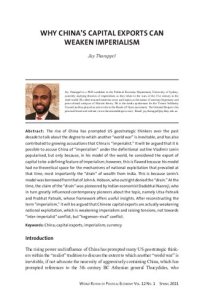
Ebook: Why China's Capital Exports Can Weaken Imperialism
Author: Jay Tharappel
- Genre: Other Social Sciences // Politics: International Relations
- Tags: China India Imperialism Lenin Naoroji Hobson Patnaik Utsa Prabhat Thucydides
- Publisher: World Review of Political Economy
- Language: English
- pdf
The rise of China has prompted US geostrategic thinkers over the past decade to talk about the degree to which another “world war” is inevitable, and has also contributed to growing accusations that China is “imperialist.” It will be argued that it is possible to accuse China of “imperialism” under the definitional outline Vladimir Lenin popularised, but only because, in his model of the world, he considered the export of capital to be a defining feature of imperialism; however, this is flawed because his model had no theoretical space for the mechanisms of national exploitation that prevailed at that time, most importantly the “drain” of wealth from India. This is because Lenin’s model was borrowed from that of John A. Hobson, who outright denied the “drain.” At the time, the claim of the “drain” was pioneered by Indian economist Dadabhai Naoroji, who in turn greatly influenced contemporary pioneers about the topic, namely Utsa Patnaik and Prabhat Patnaik, whose framework offers useful insights. After reconstructing the term “imperialism,” it will be argued that Chinese capital exports are actually weakening national exploitation, which is weakening imperialism and raising tensions, not towards “inter-imperialist” conflict, but “hegemon–rival” conflict.
Download the book Why China's Capital Exports Can Weaken Imperialism for free or read online
Continue reading on any device:

Last viewed books
Related books
{related-news}
Comments (0)